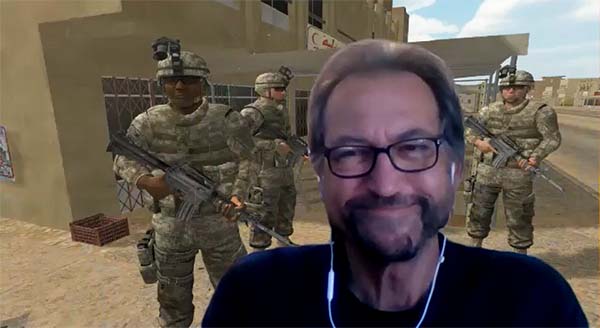Over Coffee® is on post-CES hiatus. Please enjoy this re-posting of one of our top episodes of 2022!
This post and podcast are for informational purposes only, and are not intended as medical advice. Please contact a healthcare professional with any health-related questions.

Clinical neuropsychologist Dr. Albert “Skip” Rizzo is a pioneer in the field of medical virtual reality.
Podcast: Play in new window | Download
Subscribe: RSS
Since the 1990s, Skip, as he prefers to be called, has been using immersive technology to treat his students. (He doesn’t call them “patients”.)
Today Skip is the Director of Medical Virtual Reality at USC’s Institute for Creative Technologies. He first began working in research at ICT in 1995, according to his LinkedIn profile. One of his multiple titles is “Ayatollah of VR”, listed from 1995 to the present! (We first had the pleasure of hearing him speak at Cedars-Sinai’s inaugural Virtual Medicine conference in 2018.)
Skip’s ground-breaking work has garnered multiple awards. He’s researched, designed and evaluated VR-based therapy systems for traumatic brain injury, autism and post-stroke rehabilitation. He is also the creator of BraveMind, a VR-based exposure therapy program for the treatment of PTSD.
As of December, 2022, according to their website, the U.S. FDA has endorsed the use of AR and VR devices in medical care–decades after Skip’s discoveries in the field.
But when he first started talking about using virtual reality applications at psychology conferences, he says, “(My colleagues thought I was crazy.)”
Today, he’s looking at an apparently-limitless future for mental-health VR apps. “There’s no wall here,” Skip says, when considering future directions in which he’d like to innovate.
Skip, who will be speaking at Cedars-Sinai’s 2023 Virtual Medicine conference in March, shared the story of his creative journey with medical virtual reality in this interview we recorded in February, 2022.
On this edition of Over Coffee® we cover:
- Skip’s introduction to virtual reality;
- His process, from there, in implementing VR simulations for brain-injury rehabilitation;
- What he remembers from the early days of treating his students with VR simulation-based therapy;
- How he and his team currently use VR simulations with virtual humans to help patients on the high end of the autism spectrum;
- A closer look at some of the virtual-reality applications that can enhance empathy across various areas of mental health;
- Some of the results Skip has seen;
- His vision for the future of therapeutic virtual reality.
